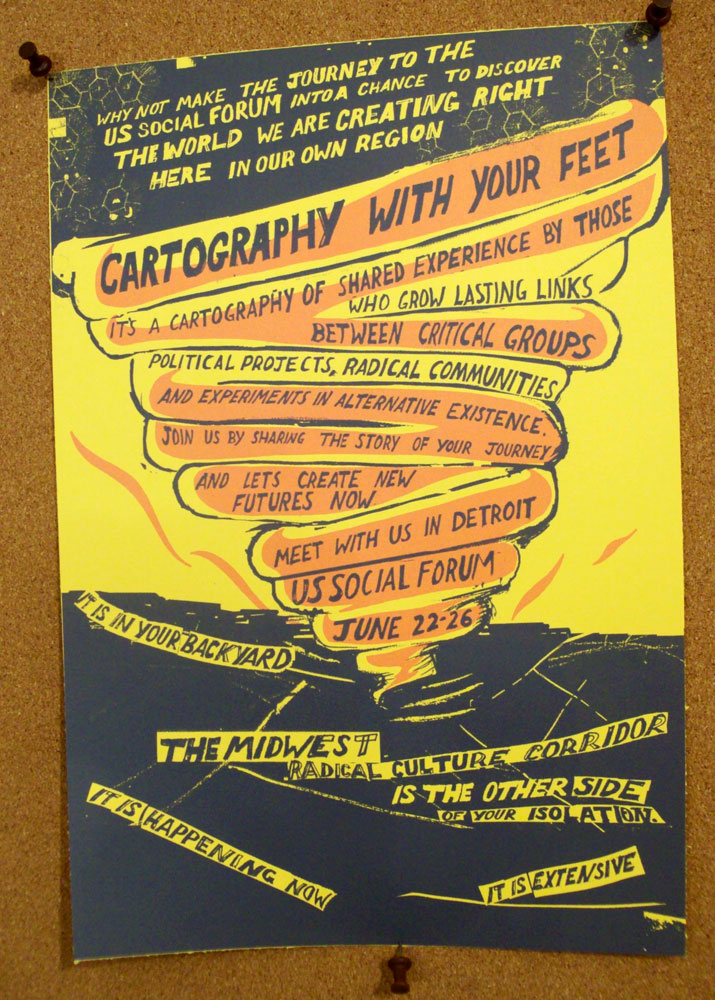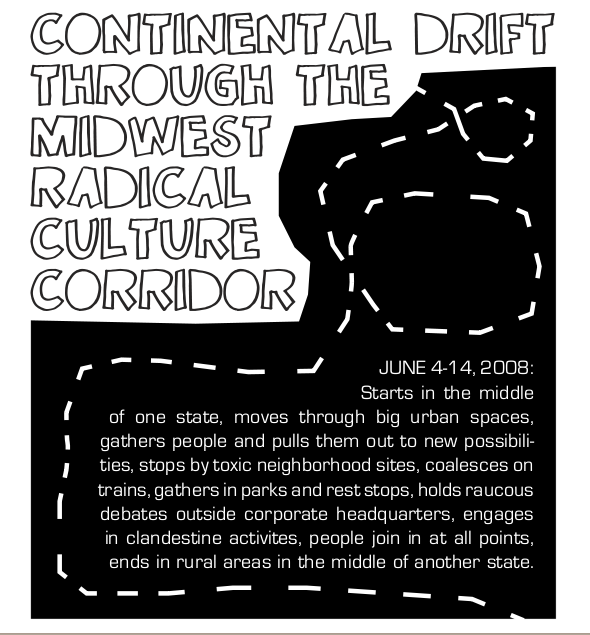 How can the scattered communities of the Rust Belt and the Corn Belt recognize each other, connect, share resources and build cultures of transformation? The Midwest Radical Cultural Corridor is a sign, a vision, an invitation to meet people in cities, towns and rural areas on the roads to Detroit, to learn about local situations and find common issues. Our group of artists and writers, The Compass, is dedicated to exploring the radical roots of better futures for the region. This workshop offers a convergence for caravanistas, bicyclists and walkers to say how they are linking their home environments, projects and struggles to other localities and initiatives. Participants can tell stories of their travels, show images with a projector and trace out routes on a large map of North America, locating the places they found most meaningful. Key themes are environmental and social justice campaigns, alternative food production, cultures of resistance and grassroots institutions. Follow-ups during the Forum will include a walking tour in Detroit in collaboration with local inhabitants. We will also carry out video interviews with participants about the life path that has led them to Detroit, to create a lasting document distributed for free. Everyone paying special attention to the territory they cross on their road to the Forum is invited to share. This workshop can be merged with any similar proposal: the point is to meet people and make the dream of the Midwest Radical Cultural Corridor into a reality. Map it with your feet!
How can the scattered communities of the Rust Belt and the Corn Belt recognize each other, connect, share resources and build cultures of transformation? The Midwest Radical Cultural Corridor is a sign, a vision, an invitation to meet people in cities, towns and rural areas on the roads to Detroit, to learn about local situations and find common issues. Our group of artists and writers, The Compass, is dedicated to exploring the radical roots of better futures for the region. This workshop offers a convergence for caravanistas, bicyclists and walkers to say how they are linking their home environments, projects and struggles to other localities and initiatives. Participants can tell stories of their travels, show images with a projector and trace out routes on a large map of North America, locating the places they found most meaningful. Key themes are environmental and social justice campaigns, alternative food production, cultures of resistance and grassroots institutions. Follow-ups during the Forum will include a walking tour in Detroit in collaboration with local inhabitants. We will also carry out video interviews with participants about the life path that has led them to Detroit, to create a lasting document distributed for free. Everyone paying special attention to the territory they cross on their road to the Forum is invited to share. This workshop can be merged with any similar proposal: the point is to meet people and make the dream of the Midwest Radical Cultural Corridor into a reality. Map it with your feet!
Category Archives: itineraries
Continental Drift through the MRCC
 From June 4 to 14, 2008, a group of people traveled through Illinois and Wisconsin in search of a Radical Midwest. Starting in Urbana, Illinois and winding our way through Chicago, Milwaukee, rural Wisconsin, and Madison, we visited places where alternate pasts and futures sprout up and grow roots in the stress-fractures of a society built on violence, exploitation, and environmental destruction. We visited community groups fighting power companies for decades of environmental racism; learned about preserving Underground Railroad sites in Chicago; watched a 35-year old film about revolutionary black street gangs with the man who wrote it; cleaned a flood-damaged bookstore; and passed the time on many, many farms.
From June 4 to 14, 2008, a group of people traveled through Illinois and Wisconsin in search of a Radical Midwest. Starting in Urbana, Illinois and winding our way through Chicago, Milwaukee, rural Wisconsin, and Madison, we visited places where alternate pasts and futures sprout up and grow roots in the stress-fractures of a society built on violence, exploitation, and environmental destruction. We visited community groups fighting power companies for decades of environmental racism; learned about preserving Underground Railroad sites in Chicago; watched a 35-year old film about revolutionary black street gangs with the man who wrote it; cleaned a flood-damaged bookstore; and passed the time on many, many farms.
The trip was called Continental Drift and extended the seminars of that name organized by Brian Holmes, Claire Pentecost, and the people at 16 Beaver Group. The name proposes a radical geography that thinks place, culture, and economics simultaneously and contends that neoliberal capitalism and American militarism—as well as the international social movements that counter them — are radically reshaping the world on scales from the interpersonal to the geopolitical. The Midwest gathering doubled this sense of the word “drift.” Through the mobile exploration of the geographies of capital and resistance in a particular place, the seminar also became a derive, favored as an affective, embodied research tool by the Situationists of fifty years ago. In contrast to earlier seminars, this Drift unfolded over ten days, 725 miles, and several rainy nights spent in tents, fostering a level of familiarity, even intimacy among the travelers and those we visited.
 click for full size
click for full size
(excerpted from the introduction to A Call to Farms)